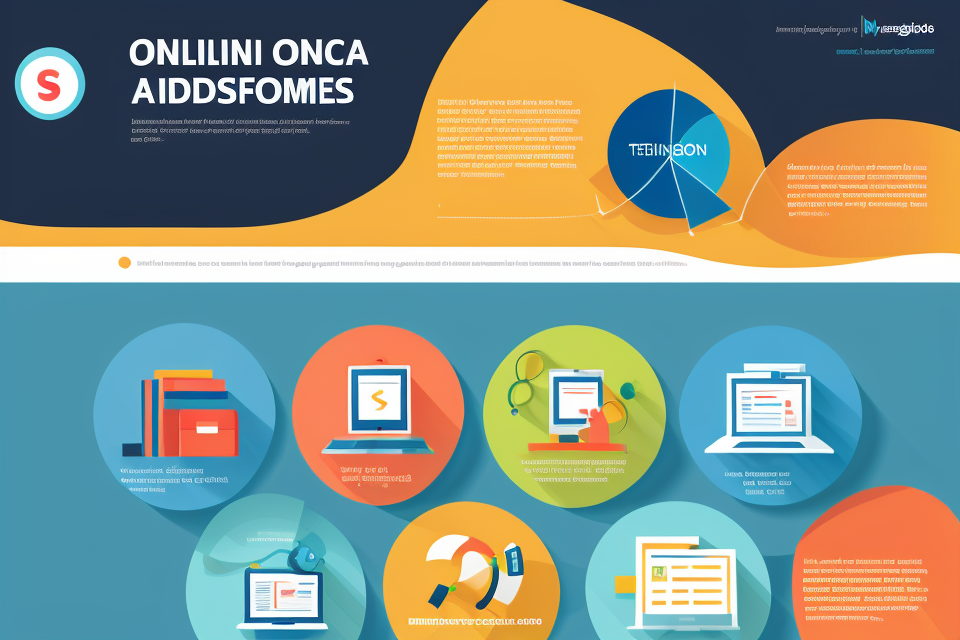
In today’s fast-paced world, online learning has become a popular mode of education. With the ease of access and convenience, many people are turning to online courses to enhance their skills and knowledge. However, the question remains, is online learning worth it? This guide will explore the pros and cons of taking online courses, and help you make an informed decision about whether or not online learning is right for you. We will cover topics such as the flexibility of online courses, the quality of education, and the potential drawbacks of online learning. So, let’s dive in and explore the world of online courses!
The Advantages of Online Courses
Flexibility
Online courses offer a high degree of flexibility that allows students to learn at their own pace and schedule. This is one of the main advantages of online learning, as it enables students to balance their work, family, and education commitments without sacrificing one for the other.
Here are some of the specific benefits of the flexibility offered by online courses:
- Learn at your own pace: Unlike traditional classroom-based courses, online courses allow students to progress through the material at their own pace. This means that students can spend more time on topics that they find challenging, and speed through those they find easy. This flexibility is particularly useful for students who may have other commitments that prevent them from attending classes in person.
- Study whenever and wherever you want: With online courses, students can access course materials and participate in discussions at any time of the day or night. This means that students can study around their work and family commitments, without having to attend classes in person. Additionally, online courses are accessible from anywhere with an internet connection, which means that students can study from anywhere in the world.
- Balance work, family, and education: Online courses are ideal for students who have other commitments that prevent them from attending classes in person. With online courses, students can balance their work, family, and education commitments without having to sacrifice one for the other. This means that students can continue working while studying, or take care of their family while studying, without having to miss out on any course material.
Overall, the flexibility offered by online courses is a major advantage of online learning. It allows students to learn at their own pace, study whenever and wherever they want, and balance their work, family, and education commitments without sacrificing one for the other.
Accessibility
- No need to leave home: One of the primary advantages of online courses is that students can learn from the comfort of their own homes. This eliminates the need to commute to a physical classroom, saving time and money on transportation costs.
- Study from anywhere with an internet connection: Online courses offer the flexibility to study from any location with an internet connection. This is particularly beneficial for individuals who may not have access to traditional educational institutions or for those who need to balance their studies with work or family commitments.
- Reduce travel time and expenses: With online courses, students can save time and money on travel expenses that would typically be required for attending classes in person. This can be especially helpful for individuals who live far away from the institution or for those who have limited financial resources.
Affordability
When it comes to the affordability of online courses, there are several key benefits to consider.
Firstly, online courses often have lower tuition fees compared to traditional on-campus courses. This is because online courses do not require the same level of investment in physical infrastructure, such as classrooms and campus facilities. As a result, the cost savings can be passed on to students in the form of lower tuition fees.
Another significant advantage of online courses is that students do not need to purchase expensive textbooks. Many online courses provide access to digital resources and course materials, which can be accessed online and downloaded as needed. This can save students a significant amount of money, especially when considering the cost of purchasing multiple textbooks for each course.
Additionally, online courses can save students on transportation and housing costs. As online courses can be taken from anywhere with an internet connection, students do not need to relocate to attend a specific institution. This means that students can save money on transportation and housing costs, which can be particularly beneficial for students who are balancing work or family commitments alongside their studies.
Overall, the affordability of online courses can make them an attractive option for students who are looking to save money while still obtaining a high-quality education.
Diversity
- Access to Courses from Top Universities Worldwide
One of the key advantages of online courses is the access they provide to high-quality educational content from top universities around the world. This means that learners can explore a wide range of subjects and disciplines, regardless of their geographical location. For example, a student in Africa can take a course from a prestigious university in the United States, opening up a wealth of learning opportunities that would otherwise be unavailable.
- Wide Range of Subjects and Specializations
Another advantage of online courses is the variety of subjects and specializations that are available. From computer science to history, and from business to psychology, learners can choose from a vast array of courses that cater to their interests and career goals. This means that individuals can tailor their learning experience to meet their specific needs and aspirations, without being limited by geographical or institutional constraints.
- Learn from Expert Instructors
Online courses also offer the opportunity to learn from some of the best instructors in their respective fields. Many universities and educational platforms carefully select their instructors based on their expertise and teaching abilities, ensuring that learners receive a high-quality education. Additionally, some online courses feature guest lectures from industry experts and prominent figures, providing learners with unique insights and perspectives that can enhance their understanding of a subject.
Self-paced Learning
One of the primary advantages of online courses is the ability to learn at your own pace. This means that you can customize your learning experience to fit your own schedule and learning style.
Customize Your Learning Experience
Online courses offer the flexibility to learn whenever and wherever you want. You can choose to complete your coursework in the evening, on weekends, or even during your lunch break. This allows you to create a schedule that works best for you and your lifestyle.
Focus on Topics That Interest You
Unlike traditional classroom settings, online courses often allow you to choose which topics you want to focus on. This means that you can spend more time learning about subjects that interest you, rather than being forced to sit through lectures on topics that do not hold your attention.
Spend More Time on Difficult Concepts
Since online courses are self-paced, you have the ability to spend more time on difficult concepts. If you are struggling with a particular topic, you can take the time to review the material as many times as necessary until you fully understand it. This can be especially helpful for students who may need additional time to grasp certain concepts.
Additionally, online courses often offer a variety of resources and tools to help you learn, such as videos, interactive simulations, and discussion forums. These resources can provide you with a more engaging and interactive learning experience, making it easier to stay motivated and focused on your goals.
Overall, the self-paced nature of online courses can provide a more personalized and flexible learning experience, allowing you to customize your education to fit your individual needs and interests.
Career Advancement
One of the main advantages of online courses is the potential for career advancement. By taking online courses, individuals can gain new skills and knowledge that can help them improve their job prospects and increase their earning potential.
- Gain new skills and knowledge: Online courses offer a wide range of subjects and disciplines, from technical skills like coding and data analysis to soft skills like communication and leadership. By taking online courses, individuals can acquire new skills and knowledge that can make them more valuable to potential employers.
- Improve your job prospects: Online courses can help individuals stand out in a competitive job market. By demonstrating their expertise in a particular field or subject, individuals can differentiate themselves from other candidates and improve their chances of getting hired.
- Increase your earning potential: Online courses can also help individuals increase their earning potential by making them more valuable to their current employer or by making them more competitive in the job market. Additionally, some online courses offer certifications or degrees that can lead to higher-paying jobs or promotions.
Overall, online courses can be a valuable investment for individuals looking to advance their careers. By taking online courses, individuals can gain new skills and knowledge, improve their job prospects, and increase their earning potential.
The Disadvantages of Online Courses
Lack of Social Interaction
While online courses offer numerous benefits, such as flexibility and accessibility, one of the major drawbacks is the limited opportunities for social interaction. Here are some ways in which online learning can lack the social connection that traditional classroom settings provide:
- Limited Opportunities to Network and Collaborate with Peers: In a traditional classroom setting, students have the opportunity to work on group projects, collaborate on assignments, and interact with their peers in a more informal setting. Online courses, however, often lack these opportunities, which can make it difficult for students to build meaningful connections with their classmates.
- May Feel Isolated and Disconnected: With online courses, students are often working independently, which can lead to feelings of isolation and disconnection. While there are online forums and discussion boards, they may not always provide the same level of connection as face-to-face interactions.
- Difficulty in Building Relationships with Instructors and Classmates: In traditional classroom settings, students have the opportunity to build relationships with their instructors and classmates, which can help to create a sense of community. In online courses, however, it can be more difficult to establish these relationships, as interactions are often limited to online discussions and email correspondence.
Technical Issues
While online courses offer convenience and flexibility, they also come with technical issues that can disrupt the learning process. These issues include:
- Reliable internet connection required: An uninterrupted and reliable internet connection is essential for online learning. Even a slight delay in loading a video or a lost connection can be frustrating and disrupt the learning process. Students may need to invest in a stable internet connection or find a suitable location with good connectivity to ensure smooth learning.
- Technical difficulties may disrupt learning: Technical difficulties such as frozen videos, malfunctioning online platforms, or software issues can disrupt the learning process. This can be particularly frustrating when students are working on assignments or projects that have strict deadlines. In such cases, students may need to troubleshoot the issues independently or seek assistance from technical support teams, which can be time-consuming.
- Need to troubleshoot technical issues independently: Unlike traditional classroom settings, online learning requires students to troubleshoot technical issues independently. This can be challenging, especially for students who are not familiar with using technology or troubleshooting software issues. While some online platforms provide technical support, students may need to invest time in searching for solutions or waiting for assistance, which can impact their learning progress.
In conclusion, while online courses offer flexibility and convenience, technical issues can be a significant disadvantage. Students need to be prepared to invest time and effort in troubleshooting technical difficulties and ensuring a stable internet connection to avoid disruptions in their learning process.
Time Management
Online courses require effective time management skills from students to ensure that they can complete their coursework on time. Unlike traditional classroom settings, online courses lack the structure and discipline of regular class schedules, which can make it easier for students to procrastinate and fall behind in their studies. This can be especially challenging for students who have other responsibilities such as work or family obligations, which can compete for their time and attention.
To succeed in online courses, students must be highly self-motivated and disciplined in their approach to learning. They must be able to create a schedule that allows them to complete their coursework while still meeting their other obligations. This may involve setting aside specific times each day or week for studying, and prioritizing their coursework over other activities.
Effective time management is crucial for success in online courses, as it can help students stay on track and avoid falling behind. Students who are able to manage their time effectively are more likely to complete their courses successfully and achieve their learning goals.
Limited Access to Resources
One of the main disadvantages of online courses is the limited access to resources. Unlike traditional classroom settings, online courses do not provide students with access to libraries, labs, and other resources that are essential for learning. This can be a significant drawback, especially for students who require these resources to complete their coursework.
Moreover, online courses may require additional expenses for equipment and materials, such as a reliable computer and internet connection, which can be a barrier for some students. In addition, students may face difficulty in accessing help and support, as they may not have access to the same level of assistance as they would in a traditional classroom setting.
However, some online courses may offer virtual resources and support to help mitigate these limitations. For example, some online courses may provide access to virtual libraries, labs, and other resources, as well as online tutoring and support services. Additionally, some online courses may offer flexible scheduling options, which can help students accommodate their coursework around their personal and professional obligations.
Overall, while online courses may have limitations in terms of access to resources, there are also various strategies and resources available to help students overcome these challenges and succeed in their online learning endeavors.
Quality of Education
When it comes to online courses, one of the biggest concerns is the quality of education. Some online courses may not meet the same standards as traditional classroom-based education. This is because online courses are often self-paced and lack the interaction and engagement that traditional classroom-based education provides. The quality of instruction may also vary depending on the institution and instructor. Some online courses may be taught by adjunct faculty members who do not have the same level of experience or qualifications as full-time faculty members.
Moreover, it can be difficult to assess the quality of education in an online course. Some of the factors that can affect the quality of education include the level of interaction with instructors and peers, the availability of resources and support, and the quality of the course materials. Therefore, it is important to carefully research and evaluate the quality of an online course before enrolling in it. It is also recommended to look for online courses that are accredited by recognized institutions to ensure that they meet certain standards of quality.
FAQs
1. What are the benefits of taking online courses?
One of the biggest benefits of taking online courses is the flexibility they offer. With online courses, you can learn at your own pace and on your own schedule, which is especially beneficial for people who have busy schedules or live in remote areas. Additionally, online courses often offer a wider range of course options and subject matter expertise than traditional in-person courses. This means that you can access high-quality education that may not be available in your local area.
2. Are online courses as good as traditional in-person courses?
The quality of an online course can vary depending on the provider and the specific course. However, many online courses are designed and taught by the same instructors who teach in-person courses, and they often use the same curriculum and materials. Additionally, online courses often offer interactive elements such as video lectures, quizzes, and discussion forums, which can enhance the learning experience.
3. What kind of technology do I need to take an online course?
In order to take an online course, you will need a computer or mobile device with an internet connection and a web browser. Some courses may also require specific software or hardware, such as a microphone or webcam for online classes that include video components. It’s important to check the technical requirements for the specific course you are interested in taking before enrolling.
4. How do I choose the right online course for me?
When choosing an online course, it’s important to consider your goals and needs. Think about what you want to learn and what kind of course will help you achieve those goals. You should also consider the provider of the course, the qualifications of the instructor, and the course curriculum. It’s a good idea to read reviews and ask for recommendations from others who have taken the course before enrolling.
5. How much do online courses cost?
The cost of an online course can vary widely depending on the provider and the specific course. Some courses are free, while others can cost several thousand dollars. It’s important to research the cost of the course before enrolling and to consider whether the cost is worth the benefits you will receive from taking the course.


